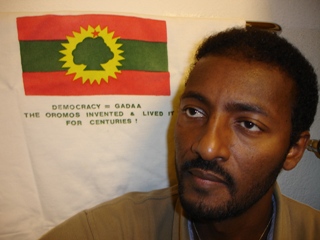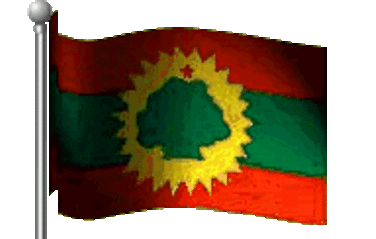Ethiopian Prime Minister Meles Zenawi is keen to fight the CCIC in anticipation of the potential aid Ethiopia would receive if it were to be viewed as a partner in the US-led war on terror.
ISN Security Watch
Regional war looms over Somalia
The Islamists have taken over another Somali city despite talks of peace, while some observers say the CCIC has everything to gain from conflicts that would only legitimize its role.
By Simon Roughneen for ISN Security Watch (-4/10/06)
Despite talks designed to secure agreement on governance in Somalia, Islamists have followed up their control of Mogadishu by seizing the country’s third city - the port of Kismayo - on 25 September, only days after a failed assassination attempt on President Abdullahi Yusuf.
Following the failed suicide bombing attempt targeting the president, the latest Islamist advance may signal a drive to assert control over the rest of Somalia, which is nominally under the jurisdiction of the Transitional Federal Government (TFG).
This has in raised international concerns that the Consultative Council of Islamic Courts (CCIC) advance could lead to “the possible Talibanization of Somalia,” Harvard University’s Robert Rotberg told ISN Security Watch.
Somalia’s neighbors also seem apprehensive that the situation could spark a regional war in the Horn of Africa.
Militias loyal to the CCIC - originally a clan-based attempt to restore Islamic-based law and order to Mogadishu - wrested control of Mogadishu on 5 June from secular warlords widely viewed as backed by the US after a three-month battle that cost upward of 300 lives.
The US sees the CCIC as a seedbed for Islamic terrorism. US President George W Bush responded to the taking of Kismayo by saying that "The first concern […] is to make sure that Somalia does not become an al-Qaida safe haven […] a place from which terrorists can plot and plan."
Islamists and the TFG were due to meet in Khartoum, Sudan at the end of October to discuss the formation of a national unity government, but it is unclear whether these talks will now go ahead. The attack on Kismayo is regarded as a breach of earlier discussions held in Sudan.
Into the vortex: regional rivalries
In response to the taking of Kismayo, hundreds more Ethiopian troops reportedly have moved over the border to the TFG outpost-headquarters at Baidoa. The CCIC regards any Ethiopian presence in Somalia as illegitimate. However, the anarchy that prevailed in Somalia since 1991 worked to undermine any notion of effective sovereignty, and the northern regions of Puntland and Somaliland have de facto seceded, with relatively stable governments seeking international recognition.
The main material-military intervention in Somalia has been two-fold: by Ethiopia in support of its TFG ally-cum-proxy; and in response, by the Eritrean government of Isaias Afewerki. Eritrea has no Islamist leanings but has sent arms consignments to the CCIC. Eritrea is also believe to be used as a staging post for weapons supplies from Iran, Egypt and Libya - including sophisticated surface-to-air missiles according to diplomats and military analysts.
Tensions have persisted between Ethiopia and Eritrea even since the end of their 1998-2000 war, a highly destructive trench conflagration that killed about 100,000 people.
With Ethiopia’s history of intervention in Somalia - the two countries fought a war in the late 1970s, and Ethiopia (in alliance with Yusuf, then a warlord) destroyed the al-Ittihad terrorist movement in Somalia during the 1990s - Eritrea knows that its enemy to the south sees itself as obliged to counter the CCIC.
Asmara in turn acts “on the basis that my enemy’s enemy is my friend,” as Richard Cornwell of the Institute for Security Studies, based in South Africa, expressed it for ISN Security Watch.
Internally, Ethiopia is prone to tensions in the mainly ethnic-Somali Ogaden region, which borders Somalia itself. Groups such as the Oromo Liberation Front (OLF) and the Ogaden National Liberation Front (ONLF) have engaged in sporadic conflict with the Zenawi regime since the early 1990s. Both rebel groups have reportedly established contact with the CCIC, and CCIC hardliner Sheikh Aweys has spoken in favor of Somalia retaking the Ogaden, according to Rotberg.
Kenya has voiced anxiety at the UN about the political and humanitarian situation in Somalia, and remains watchful of some of its own Somali-linked Islamic leaders.
Kenya’s remote border with Somalia is difficult to police and defend, something Nairobi is keenly aware of as it contemplates the Islamist advance. Moreover, the months since the CCIC took Mogadishu has seen an increase in the number of Somali refugees into Kenya, stretching the national and UN capacity.
Somali-linked al-Qaida operatives were responsible for the 1998 attack on the US Embassy in Nairobi, and for the attempt to shoot down an Israeli passenger jet over Monbasa in 2002. Kenyan authorities fear that regional destabilization caused by an Islamist conquest of Somalia would have dire economic and political implications.
It is also likely that Ethiopian Prime Minister Meles Zenawi is keen to fight the CCIC in anticipation of the potential aid Ethiopia would receive if it were to be viewed as a partner in the US-led war on terror. Much of Ethiopia's foreign aid has dried up because of allegations of human rights abuses, and Zenawi sees Somalia as a way to get the aid flowing again.
Kenya would also like to jump start international aid, since World Bank allegations of corruption earlier this year prompted the suspension of US$265 million in loans. With former Bush administration official Paul Wolfowitz at the helm of the World bank, diligent efforts to prosecute the war on terror may be seen by beneficiaries as a solid means to gain financial credits.
In the meantime, the TFG has called for an international arms embargo to be lifted as it seeks to defend itself against the CCIC. The Horn of Africa regional body known as the Intergovernmental Authority on Development (IGAD) proposes to send peacekeepers – which the CCIC has strongly opposed.
Richard Cornwell of the Institute of Security Studies in South Africa told ISN Security Watch that the African Union (AU) backing for such a peacekeeping mission was really just dangerous "bluster."
"IGAD has not the means to launch such an expedition,” he said.
A CCIC spokesman described the taking of Kismayo as a pre-emptive strike to prevent foreign troops or peacekeepers gaining a beachhead in Somalia.
While the CCIC has its own internal divisions, the attack on Kismayo and the assassination attempt on Yusuf appears to signal a victory for the hardline elements in Somalia.
Chairman Sheikh Sharif initially emerged as the moderate face of the CCIC. However, Sheikh Aweys, a former leader of al-Qaida affiliate al-Ittihad, has apparently emerged as the predominant figure. While the CCIC has denied any intention to force any particular type of government on their people, or forge new links with al-Qaeda or international terrorism, Aweys has publicly called Kenya "an enemy of the Somali people" and consistently threatens Ethiopia, which is not slow to reciprocate.
Contesting a contested legitimacy
Both the TFG and CCIC are attempting to assert their legitimacy largely over the heads of Somali citizens. Political legitimacy in Somalia is derived more from clan identity than from Somali nationalism or Islamist credentials. The CCIC, with foreign military and financial backing, has demonstrated greater military capacity than the TFG, which is dependant on Ethiopian support.
The TFG is riven with clan-based disputes, which culminated in a public row between Yusuf and his Prime Minister, Gedi earlier this year. In July, over 40 ministers resigned from the TFG, and on 7 August, Yusuf dissolved the cabinet. Somalis see the TFG as a foreign-imposed and ineffective government.
After more than two years, the TFG has had negligible success in promoting reconciliation or curbing the power of Somali warlords. Some ministers in the pre-June TFG cabinet were themselves former warlords, as is Yusuf. Nevertheless, the TFG is the only tangible result of a protracted, internationally brokered reconciliation process, and as such continues to be supported by the UN, the US, the AU, and the EU. However these same backers have failed to support the TFG materially or invest in rebuilding Somalia.
Warlords and clan leaders/alliances in the traditional non-Islamist sense have been unable to match the resources available to the CCIC, Rotberg told ISN Security Watch.
The CCIC itself is to a large extent a Hawiye clan project, in opposition to the Darod-backed TFG, though there are exceptions to this given that Gedi is from the Hawiya clan.
According to Cornwell, “the CCIC’s seizure of Kismayo is significant in that it was relatively bloodless and saw defections to the CCIC. This will help broaden the CCIC from its Hawiye clan base.”
Residents greeted the CCIC conquest of Mogadishu with jubilation, understandable after 15 years of chaos. However, hardline social decrees, calls for the abolition of civil society organizations and the marginalization of many business and civic leaders who lent the CCIC both moral and material support in the past year have led to a rethink, and the possibility of secular warlords re-emerging in the capital to contest CCIC dominance.
When the CCIC militias invaded Kismayo, they shot dead three protesters who decried the burning of the Somali flag by Islamists. Despite this, a large-scale Ethiopian assault on the CCIC would likely align many Somalis behind the Islamists, with newspaper reports outlining how educated and self-styled moderate civilians regard Ethiopia as a putative regional hegemon to be opposed at all costs. As such, the CCIC can align its Islamist thinking with popular Somali nationalism, threatened by an ancient enemy and US/Western meddling.
This plays heavily into CCIC calculations, which take into account the fact that the more of Somalia its brings under its control, the more likely a punitive Ethiopian response.
For now, it may be unnecessary to move on Baidoa - as the international will does not seem to be there to pressure the CCIC. However, Ethiopia may not want to let the TFG “wither on the vine,” as Cornwell described its prospects to ISN Security Watch after the fall of Kismayo.
An Ethiopia-CCIC conflict - with regional involvement and global repercussions - is growing more likely by the day. This would give the CCIC the legitimacy it needs to establish itself as the pre-eminent domestic political and military force in Somalia.
Source: ISN Security Watch


